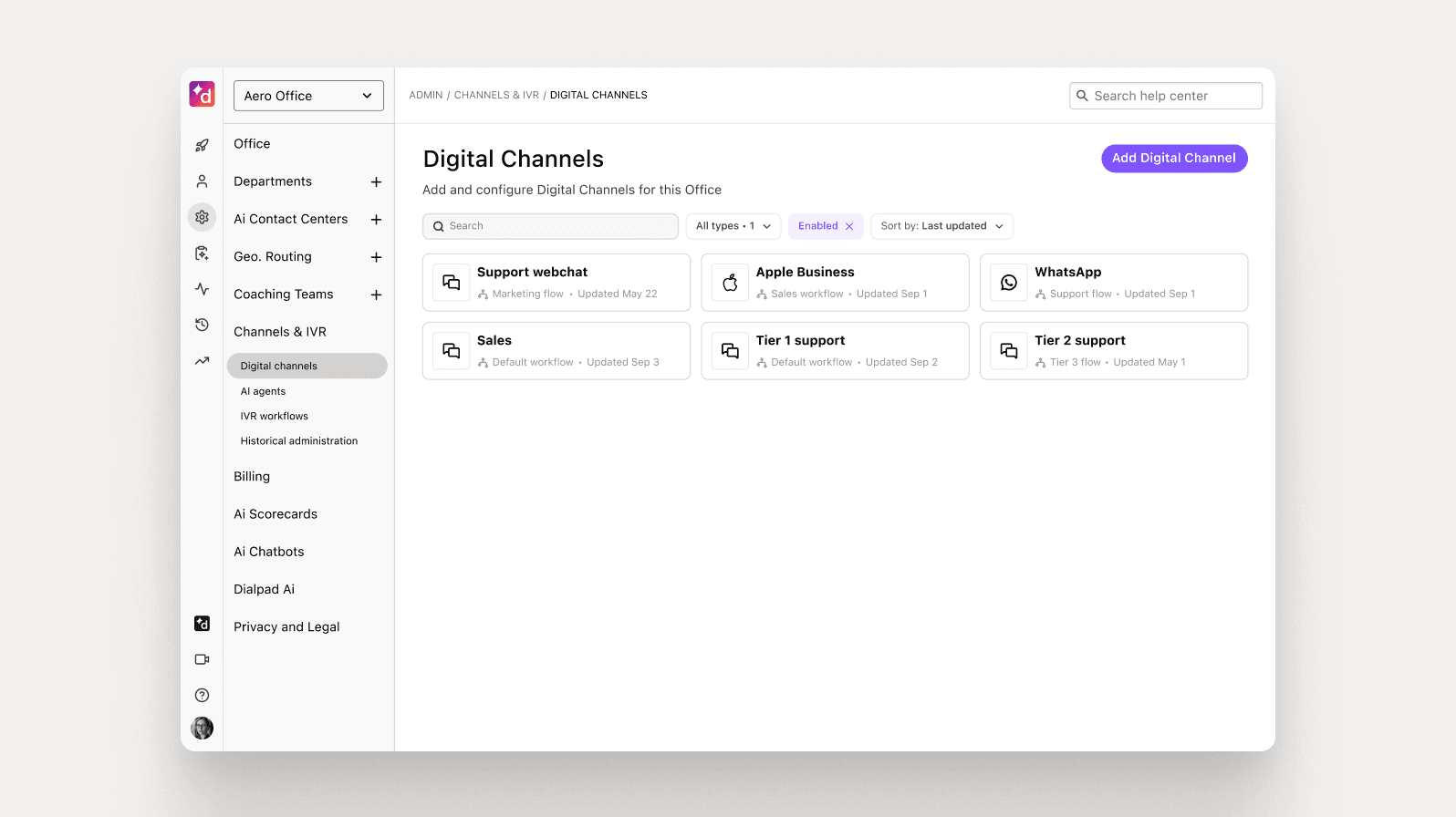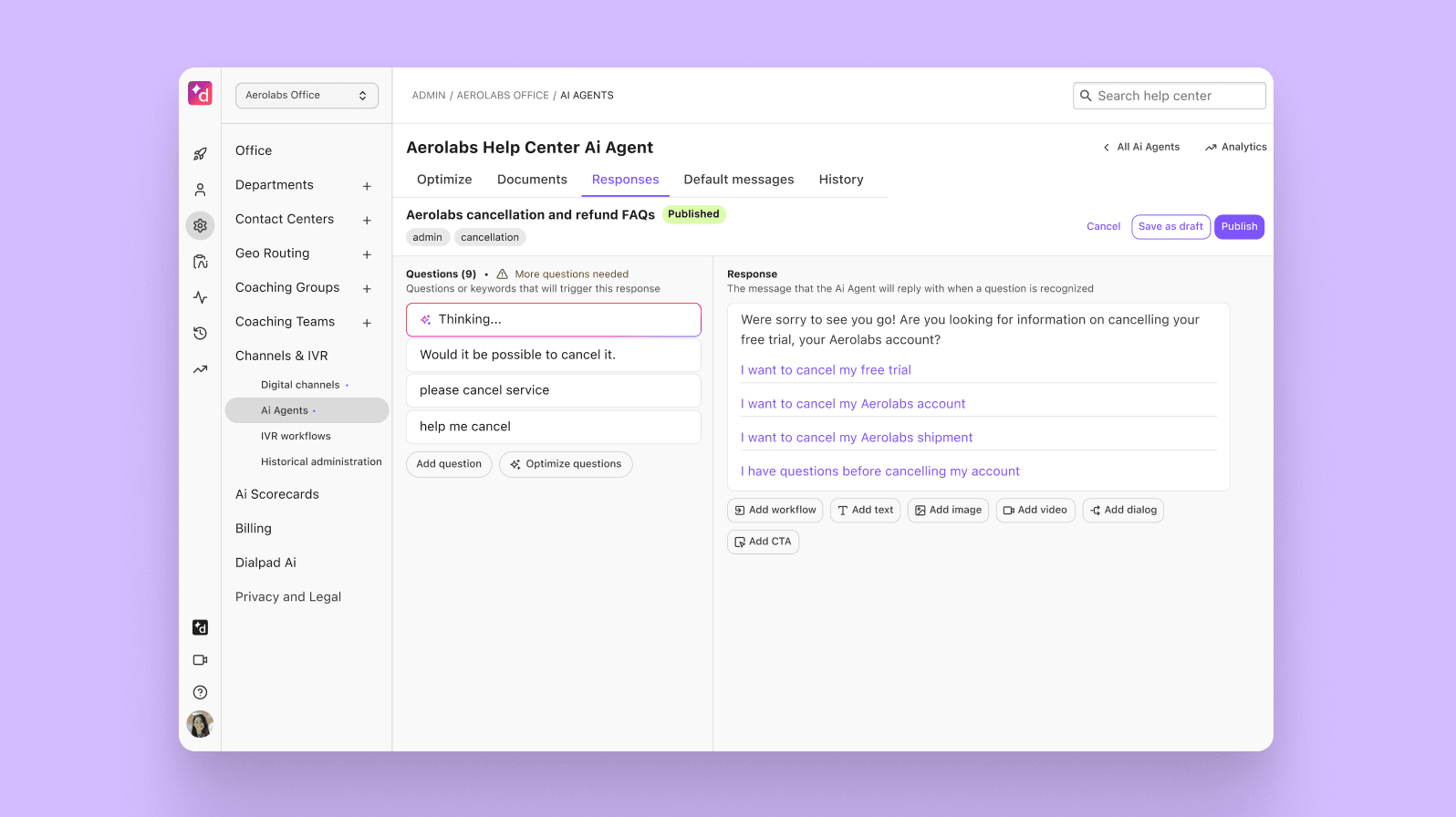Meet Dialpad’s agentic Ai
Dialpad’s agentic Ai acts autonomously to solve customer needs in real time, from scheduling appointments to providing order updates without needing to be prompted. Free up your agents for more complex conversations that need a human touch. Chat with us to learn more or apply for early access!

What is agentic Ai: An overview
Agentic Ai refers to artificial intelligence systems that can operate autonomously toward specific goals without constant human direction. Unlike traditional Ai, which typically waits for input before taking action, agentic Ai proactively perceives context and takes initiative—whether that means drafting a response, flagging an issue, or surfacing a key insight.
This shift from reactive to proactive intelligence marks a major leap in how Ai can function within contact center settings. Beyond just enhancing productivity, agentic Ai can begin to act as a co-worker that can handle tasks without being told explicitly what to do.
Agentic Ai vs. Ai agents
While the two terms are sometimes used interchangeably, there’s a subtle but important distinction between agentic Ai and Ai agents.
Ai agents are similar to advanced chatbots that can perform specific tasks like answering a question or searching a database. They are very useful, and do leverage Ai, but usually require inputs or commands to operate. You’ll often come across Ai agents on a website’s chat window or when messaging a company on digital channels like WhatsApp.
Agentic Ai, on the other hand, refers to an Ai system that can operate autonomously without being explicitly directed at each step. In other words, Ai agents can be agentic—but not all of them are.
Think of it this way:
An Ai agent might help answer a support ticket.
An agentic Ai system could notice a recurring issue across tickets, create a help doc, notify the right team, and begin routing similar tickets more efficiently without being asked.
How are organizations beginning to use agentic Ai to redefine business communications?
What’s happening now
Today, many businesses are already deploying forms of not-quite agentic Ai solutions to take on repetitive and time-sensitive communication tasks. For example, in meetings it’s common to see Ai communications platforms like Dialpad automatically transcribing conversations, detecting action items, and summarizing takeaways.
In customer interactions, contact center Ai tools can monitor sentiment in real time and prompt actions to agents based on playbooks. Currently, Dialpad’s contact center platform offers an Ai-powered chatbot that runs 24/7, helping deflect common questions and freeing up human agents for higher-value conversations.
What’s coming next
But this is still only the beginning. Ai will soon become more than just task-based assistants. Dialpad will offer more advanced agentic Ai applications that can automatically authenticate customers, reschedule appointments, provide order status updates, and more—all without being explicitly told to do so.
Imagine: Ai-powered voice and chat agents that can access workflows, APIs, and business systems to get things done on your behalf, completely autonomously. As agentic Ai tools become more advanced, they’ll be able to do more than just supporting customer communications—they will help lead them, coordinating across teams and autonomously updating systems of record like CRMs or ticketing platforms.
Agentic Ai tools and examples
A good agentic Ai platform has to be able to perceive context, retain memory across interactions, reason through complex decisions, and take action through APIs or external tools. While it’s possible to build these systems from the ground up, the cost and complexity of doing this can be a significant barrier for most organizations—and not the best investment of time and resources.
In some cases, it’s better to take a more scalable approach, which often begins with an assessment of your current tech stack. Work with your IT leadership to identify which tools already support agentic capabilities and where integration or scalability may become bottlenecks.
Often, choosing a platform with native Ai functionality—especially in communication-heavy environments like contact centers—can significantly accelerate time to value and reduce operational overhead.
Here are some examples to show the range of agentic Ai companies already in the market today:
Dialpad - An omnichannel contact center platform with native Ai capabilities. Today, it supports real-time agent assistance and intelligent transcription, and will soon expand into fully agentic use cases (such as autonomous order tracking, appointment scheduling, and proactive follow-ups) without the need for manual intervention by agents or supervisors.

AutoGPT and LangChain: Open-source frameworks that allow developers to deploy Ai agents capable of handling multi-step tasks.
ReAct Agent: Built on the ReAct (Reasoning + Acting) framework, this Ai agent combines large language model reasoning with real-time decision-making and external tool interaction.
Zapier, Make, Workato (and other automation platforms): Low-code automation tools that can power agentic Ai workflows when paired with LLMs.
Google, AWS, Microsoft (and other hyperscalers): Cloud providers that supply foundational models and orchestration components to enterprises that prefer to build and customize agentic Ai solutions in-house.
Sierra, Cresta, Parloa and other specialist startups: Companies focusing deeply on niche applications like IT help desks and European telecom—delivering agentic Ai with domain-specific precision and speed, often at the expense of general-purpose breadth.
Agentic Ai in customer support
When it comes to resolving customer issues and troubleshooting, the best agentic Ai for customer support software tends to enable faster resolutions and better customer experiences by:
Automatically diagnosing a technical issue by referencing a knowledge base and initiating a fix or providing a step-by-step guide.
Handling refund requests by checking order details, confirming eligibility, and executing the refund process without human involvement.
Notifying customers about service outages or upcoming expirations.
Monitoring interactions for quality and compliance, and flagging risky language or high-frustration calls before they need to be escalated.
Initiating chats if user behavior suggests confusion or frustration (e.g., stuck in a payment flow).
Negotiating subscription downgrades or cancellations with dynamic offers.
Resolving billing disputes by retrieving transaction histories, explaining charges, and applying credits if needed.
Agentic Ai use cases in sales
In sales, agentic Ai can act as an always-on teammate, accelerating the sales cycle and improving win rates. Here are a few key use cases:
Meeting prep and recap: Pull relevant account insights before a call, then deliver a detailed summary and follow-up afterward.
Pipeline acceleration: Track buyer intent and engagement in conversations to prioritize deals more effectively.
Objection handling: Surface real-time guidance or battle cards when specific competitor names or objections are mentioned (which can already be done in Dialpad Sell).
CRM hygiene: Automatically log activities, update fields, and reduce administrative burden.
Dialpad’s agentic Ai vision and platform
Dialpad has been laying the foundation to provide the leading agentic Ai platform for customer support by transforming traditional contact center interactions into intelligent, proactive customer experiences.

With real-time agent coaching already built into its native Ai platform, Dialpad is now taking the next leap—introducing fully autonomous agentic systems that can plan and act independently.
These systems can execute complex agentic Ai workflows with minimal oversight and ensure seamless collaboration between Ai and human agents. With Dialpad’s agentic Ai platform, businesses will soon be able to deploy real-world solutions such as:
Appointment management – Customers can reschedule or cancel appointments autonomously through Ai agents that access calendars and update records.
Order tracking – Ai agents will authenticate customers, access internal systems, and deliver real-time shipping updates.
Recruitment screening – Ai agents will conduct initial candidate interviews and schedule follow-ups automatically with HR tools.
These are just a few agentic Ai examples of how Dialpad is enabling pre-emptive customer service, where Ai anticipates needs and resolves issues before they escalate.
As agentic Ai applications continue to evolve, their impact across communications, contact centers, and sales outreach will be transformative, including:
Proactive customer engagement before problems arise, which reduces churn and improves satisfaction.
Routing and prioritizing tickets based on urgency, sentiment, and historical context.
Co-managing workloads with live agents, freeing human reps for more strategic conversations.
More intelligent sales outreach by researching prospects, drafting messages, and scheduling follow-ups autonomously.
Dialpad is uniquely positioned to lead this shift, leveraging billions of business conversation data—making Dialpad Ai’s outputs not only accurate, but also deeply relevant. Equally importantly, Dialpad is building with enterprise-grade security in mind, including role-based access, customizable data retention and management, and more.
Ready to take your first steps with agentic Ai?
Apply to get early access to industry-leading agentic Ai tools that work proactively so your contact center team can focus on what matters most—selling, supporting, and building relationships.
